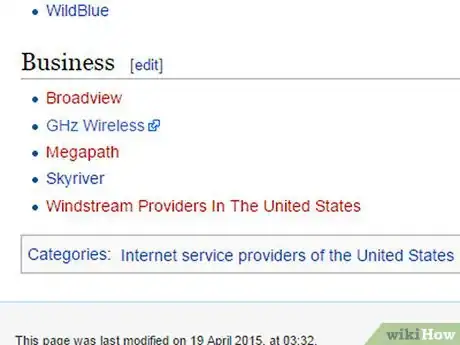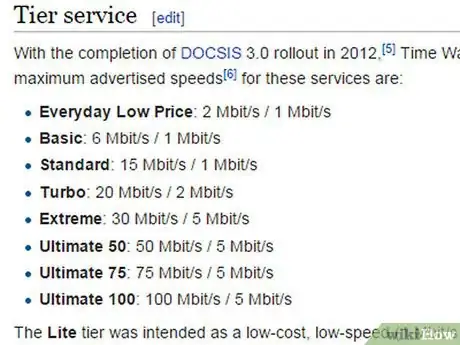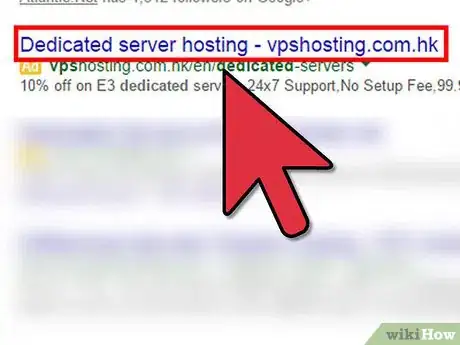X
wikiHow is a “wiki,” similar to Wikipedia, which means that many of our articles are co-written by multiple authors. To create this article, 25 people, some anonymous, worked to edit and improve it over time.
This article has been viewed 104,460 times.
Learn more...
With the advent of the internet into all our lives and the growth of e-commerce all over the world, entrepreneurs do look for web hosting companies that provide cost-effective, managed services that allows them a higher internet presence and thereby a vast audience.
Steps
-
1Start by deciding what are the types of hosting you are going to provide. This can vary from shared hosting to dedicated server hosting to colocation facilities. Categorize the products that you have knowledge about and then decide on the range of products you can handle.
-
2Decide on plans and pricing for your hosting services. Research your competitors to figure out what services they offer at what prices. Choose prices and plans that will be competitive in the market, but keep your prices fair for both your company and your consumers.Advertisement
-
3Plan out your client handling mechanism. This can be a WHMCS panel through which all your website orders and client handling can be optimized, or something similar.
-
4Get your hosting business rolling by tying down a cost effective ISP for your leased line. Bandwidth is a major constraint that all hosting providers have to look at since it is at the core of any hosting business. For this reason, it's crucial to tie down an ISP who can provide you with a bandwidth at a reasonable price with service level agreements of 99.99% uptime with IP pools.
-
5Plan your bandwidth purchases. Buying bandwidth is one of the most important aspects of your business strategy, as this well enable you to decide on your sales techniques as this is the most important resource in the web hosting business. To start off, a purchase of Bandwidth of about 10Mbps will allow you around 1000 VPS accounts, so decide on your whole budgeting based on the bandwidth.
-
6Consider investing in power. Your hosting accounts will have to be online 24/7, and therefore will be in the higher ranges of power consumption. Think about how you'll keep these accounts live, even in the case of emergencies. With these considerations in mind, power should be an important chunk of your investment.
-
7Think about hardware purchases. Getting hardware as per you clients' requirements and balancing various accounts on them will be critical for Dedicated, VPS and Shared hosting businesses, since most of the providers do not charge any installation cost for them. If you can get the best deals for hardware purchases then you can save a major sum from your investment.
-
8Consider licensing purchases. A provider will have to decide on the product line that he is getting into, for example : clients require cPanel with their Linux VPS accounts for which the license cost is variable from one provider to another depending on deals with cPanel.net, so having a pricing range for all such license purchases in sync with the bandwidth calculations (shall provide you a cost per client) and strategy of deciding product share (Dedicated vs VPS vs Shared Hosting) in your business will provide you with a complete overview of pricing ranges.
-
9Know about support team costs. Managing 10 accounts, starting off, will not be an issue for you. But once your business grows and there are hundreds of tickets that need resolution, you will need a strong support team. Since support is one thing that clients look at in the most minutest of details, and most of them going for monthly contracts will keep you on your toes with respect to longevity of accounts that provide you recurring incomes. So, keeping aside a small amount to get in system administrators as and when your client base increases is a sound strategy to have for sustaining your business.
-
10Make your presence felt among web hosting business and competing. Once you have streamlined and decided on your business strategy comes the most exciting part, competing. You will need to be a competitive provider, keeping your existing clients happy, getting in new clients and making your presence felt in web hosting communities and forum.
-
11Always be a part of existing discussions on various forums. Use web hosting talk or web cosmo forums, etc. to make your online presence felt. Always have something constructive to say, since these forums are a powerful marketing tool for your business and say a lot about your business.
-
12Deciding on various online marketing strategies such as SEO, SEM, running a Google AdWords campaign can also provide you with an option of creating a larger client base.
-
13These are a few major aspects of any web hosting business. One thing you must note, that all these constraints are really important from a customers point of view, since in hosting, stability and support along with guaranteed uptime are the most crucial parameters.
Advertisement
Community Q&A
-
QuestionWhat's the startup cost for a small web hosting company?
 Mike ConnorsCommunity AnswerThe costs can be on the high side, as you need to hire programmers and IT people, and they do not come cheaply. A cheaper option is to use a system like wdwebreseller.com. It is like having your own Wix/square Space system, under your own company name. It comes with templates, hosting and a basic shopping cart for $5 a month per website.
Mike ConnorsCommunity AnswerThe costs can be on the high side, as you need to hire programmers and IT people, and they do not come cheaply. A cheaper option is to use a system like wdwebreseller.com. It is like having your own Wix/square Space system, under your own company name. It comes with templates, hosting and a basic shopping cart for $5 a month per website.
Advertisement
About This Article
Advertisement































































